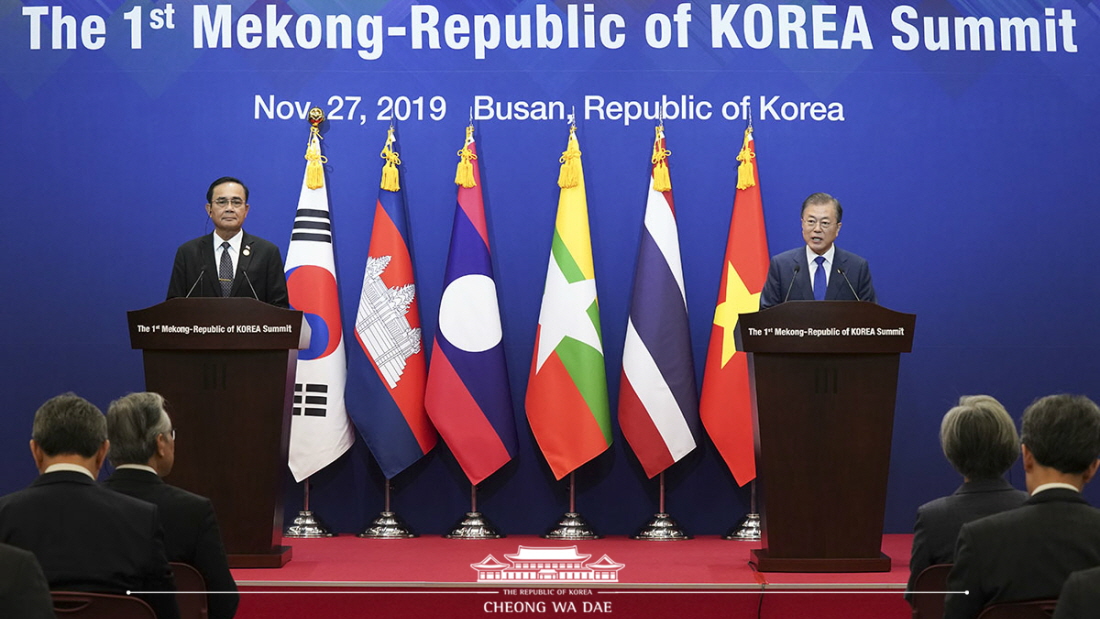이 웹사이트는 제19대 대통령 임기 종료에 따라 대통령기록관이 「대통령기록물 관리에 관한 법률」에 의해 이관받아 서비스하는 대통령기록물입니다. 자료의 열람만 가능하며 수정 · 추가 · 삭제는 불가능합니다.
다만, 「개인정보보호법」에 의하여 개인의 정보를 보호받기 원하시는 분은 관련 내용(요청자, 요청내용, 연락처, 글위치)을 대통령 웹기록물 담당자(044-211-2253)에게 요청해 주시면 신속히 검토하여 조치해 드리겠습니다. 감사합니다.
SPEECHES & REMARKS
BRIEFINGS
Opening Remarks by President Moon Jae-in at Joint Press Conference Following 1st Mekong-Republic of Korea Summit

The inaugural Mekong-Republic of Korea Summit has been held in Korea in this year that marks the 30th anniversary of the establishment of ASEAN-ROK dialogue relations. I am grateful to Prime Minister Prayut for having served as Co-Chair for this summit right after having done so at the ASEAN-ROK Commemorative Summit. I also extend my appreciation to the leaders of the Mekong countries who have helped raise Mekong-ROK cooperation to the summit level.
The world is now attentively eyeing the dynamism and growth potential of Mekong countries. Despite negative fallout from protectionism, these countries are leading regional development with their high economic growth.
The Republic of Korea has continued to work with the Mekong countries in the hope of supporting their growth and becoming their reliable partner for mutual prosperity in the future.
Last year, trade volume between Korea and the Mekong countries surpassed US$84.5 billion, a 2.4-fold increase from 2011. The number of mutual people-to-people exchanges roughly tripled to reach close to seven million. Those projects initiated by the Mekong-ROK Cooperation Fund have gradually expanded their scale.
Today, we leaders confirmed that Mekong-Korea cooperation has matured and become more solid institutionally. At the same time, we shared an understanding that there will be no limit to the areas requiring further cooperation going forward.
The Mekong leaders expressed active support for Korea’s New Southern Policy. We discussed three development paths to build a people-centered Mekong-ROK partnership of peace and prosperity based on the ROK-Mekong Vision.
First, the Mekong countries and Korea will jointly share experiences and move together toward mutual prosperity.
The Korea Development Institute and the Korea Institute of Science and Technology are research institutes that served as the cornerstone of Korea’s economic development. We leaders agreed to strengthen cooperation in the public administration sector and establish a public research institute in the Mekong region that will be modeled after those two.
We came to an agreement to jointly respond to the Fourth Industrial Revolution; carry out ICT-based cooperative projects in such fields as education, new growth industries and forest preservation; and nurture individuals with a future-oriented capacity for innovation. We will also work together to implement the type of rural development projects through which Korea’s Saemaul Undong was disseminated and various other projects aimed at enhancing the capabilities of coming generations who will be the main drivers of future cooperation.
Second, we agreed to cooperate more closely for sustainable prosperity.
We concurred on strengthening cooperation in areas such as biodiversity, water resources and forests and on jointly responding to the transnational threat surrounding the Mekong River basin.
Through the Korea-Mekong biological diversity center to be established in one of the Mekong countries, we will preserve the rich biological resources of the Mekong and explore ways to harness some as new bioindustry growth engines. The Korea-Mekong water resources joint research center to be established within the Korea Water Resources Corp. will serve as a foundation to help utilize the abundant water resources of the Mekong River in a safe and efficient manner.
The Korea-Mekong Future Peace Community project will help the people of the Mekong countries lead happier lives by removing landmines and unexploded ordnance in rural areas, providing support for victims and developing rural communities.
In order to promote peace through forest cooperation, Mekong country leaders have endorsed the Republic of Korea’s Peace Forest Initiative. We leaders agreed to continue our forest cooperation projects through the Korea-Mekong Forest Cooperation Center and the Asian Forest Cooperation Organization.
Third, the Mekong nations and Korea will work to build a peaceful and mutually prosperous East Asia where people are happy.
Our common goal is to help the 300 million people living in the Mekong region and Korea thrive together while engaging in close interactions.
All the Mekong leaders welcomed the designation of 2021 – the 10th anniversary of Korea-Mekong ministerial cooperation – as the year of Korea-Mekong exchanges. It will serve as an opportunity for the peoples of Korea and Mekong countries to engage in more frequent exchanges and promote understanding of each other’s culture.
The Mekong region’s growth starts with the narrowing of development gaps. Korea agreed to contribute to the strengthening of regional connectivity by expanding such infrastructure as roads, bridges, railroads and ports, as exemplified by construction of the Korea-Myanmar Friendship Bridge, or Dala Bridge.
The Mekong leaders expressed their agreement that peace and stability on the Korean Peninsula are essential for the common prosperity of Korea and the Mekong region. They discussed the idea of transforming the Demilitarized Zone into an international peace zone and agreed to work together to achieve complete denuclearization and permanent peace on the Korean Peninsula.
Today, which will be remembered as the first year of the new Korea-Mekong cooperation, we laid the cornerstone to drastically develop Korea-Mekong relations. The Mekong-Hangang River Declaration for Establishing Partnership for People, Prosperity and Peace, adopted as the summit’s outcome, will serve as a milestone in the process of creating a people-centered partnership of peace and prosperity that goes beyond economic cooperation.
I extend my heartfelt gratitude to the leaders of the five Mekong nations for being here and look forward to seeing you all again in Vietnam next year.
Thank you.



